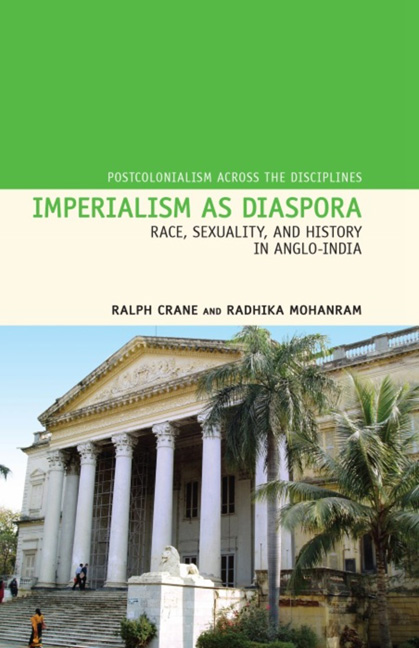Book contents
- Frontmatter
- Contents
- List of Illustrations
- Acknowledgements
- Introduction: Race, Gender, and Diaspora: Explorations of Anglo-India
- 1 Masculinity Forged Under Siege: The Indian Mutiny of 1857
- 2 The Terrains of Identity: Mimicry and the Great Game
- 3 The Missionary's Position: Love and Passion in Anglo-India
- 4 The Laws of Desire: Intimacy and Agency in Anglo-India
- Epilogue: Imperialism as Diaspora
- Bibliography
- Index
4 - The Laws of Desire: Intimacy and Agency in Anglo-India
- Frontmatter
- Contents
- List of Illustrations
- Acknowledgements
- Introduction: Race, Gender, and Diaspora: Explorations of Anglo-India
- 1 Masculinity Forged Under Siege: The Indian Mutiny of 1857
- 2 The Terrains of Identity: Mimicry and the Great Game
- 3 The Missionary's Position: Love and Passion in Anglo-India
- 4 The Laws of Desire: Intimacy and Agency in Anglo-India
- Epilogue: Imperialism as Diaspora
- Bibliography
- Index
Summary
In this chapter, we will examine the status, politics, and semiotics of Anglo-Indian interracial marriage, because, encapsulated within it are competing discourses, which infuse this topic with ambivalence - as simultaneously inevitable and forbidden, as sexually desirable, but politically and socially unacceptable - revealing the complex relationship between power and sexual desire that is represented as binaries and, finally, interracial desire as the very condition of narration itself. Both in the United States, with its problem of slavery, and in the British Empire, with its colonies, along with the prominent role that Britain played during the slave trade, miscegenation was the sexual taboo of the nineteenth century; the intimate relationship between a black and a white signified the Victorian version of the love that dare not speak its name. This simultaneous fear and intimacy with the (racialized) Other was the impetus to the development of racial science, as well as one of the cornerstones for the development of the natural sciences of the nineteenth century. If comprehensions of the dominant self and body in the nineteenth century were predicated on an immediately visible physical otherness that demanded the strict demarcation between black and white bodies, then there was an urgency to confront and root out any form of race-mixing. Indeed, even in the twenty-first century, our attitudes to race are the legacies of the racial science that first originated in the nineteenth century, whether we fill out our racial identity in equal opportunity forms or are categorized in precise ways because of our racial appearance. Structured and constructed in the nineteenth century, our racial histories are central to our interpellation in the twenty-first century as well.
In this chapter, we specifically wish to explore love, intimacy, and desire in Anglo-India. Notwithstanding the taboo of sexual intimacy between colonizer and colonized - in fact, the taboos become part of official discourse throughout the British colonies, as seen, for example, in the Burma Circular of 1867 and the Crewe Circular of 1909 - the large bi-racial population everywhere in the colonies suggests the constant violation of that taboo.
- Type
- Chapter
- Information
- Imperialism as DiasporaRace, Sexuality, and History in Anglo-India, pp. 108 - 135Publisher: Liverpool University PressPrint publication year: 2013



